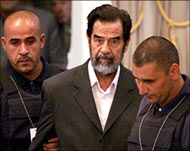Amr Moussa in Iraq to push for peace
Arab League chief Amr Moussa, who has said Iraq is on the verge of civil war, has held talks with Iraqi leaders to promote national reconciliation in a country ravaged by violence.

On his first postwar visit to Iraq, the former Egyptian diplomat met Prime Minister Ibrahim al-Jaafari on Thursday and was also expected to hold talks with President Jalal Talabani and leading Shia cleric Ayat Allah Ali al-Sistani.
“We spoke about the new Iraq and the specific mission of the head of the Arab League … in the framework of a national dialogue and national Iraqi reconciliation,” Secretary-General Moussa said after his talks with al-Jaafari on Thursday.
“We are working so this will be the basis for Iraq’s future.”
For security reasons, the 22-member league had not announced the timing of the secretary-general’s visit, his first to Iraq since a US-led invasion toppled Saddam Hussein in 2003.
When a league delegation visited Iraq earlier this month, armed men attacked its convoy and killed three police escorts.
Sensitive time
Moussa arrived at a sensitive time for Iraq, which watched its former president Saddam Hussein go on trial on Wednesday on charges of crimes against humanity connected to the killing of 148 Shia Muslims from the village of Dujail in the 1980s.
Iraqi and US officials hope the high-profile trial will help Iraqis bury their past and ease violence.
 |
|
Saddam has pleaded not guilty |
A 15 October referendum on a constitution backed by Iraq’s new Shia and Kurdish leaders and fiercely opposed by Sunni Muslims is expected to pass, raising fears of an intensified campaign of bombings and attacks by Sunni fighters.
In the latest development, Iraqi security forces have arrested a nephew of Saddam on suspicion of financing fighters, National Security Adviser Mowaffaq al-Rubaie said on Thursday.
Yasser Sabawi was captured in Saddam’s hometown of Tikrit on Wednesday as residents protested to mark the beginning of the ousted president’s trial, Rubaie said.
“He is one of the people who fund terrorism and we believe there is strong evidence that he is one of the channels that brings in funds used to finance the terrorist operations in the north and the northeast of the country.”
Saddam showed his trademark defiance when he took the stand, refusing to state his name for the judge and challenging the authority of the court created under US occupation.
Lack of strategy?
Moussa has criticised what he says is the lack of any clear strategy to reconcile Iraq’s rival communities, warning that
civil war could erupt at any moment.
Arab states such as conservative Sunni-ruled Saudi Arabia have complained that non-Arab Shia Iran is gaining influence in Iraq to the detriment of regional stability.
Oil-rich Gulf Arab states backed Iraq in its 1980-88 war with Iran. Iraqi Shia leaders who lived in exile in Tehran now dominate the Baghdad government, raising concerns in Riyadh and other Arab capitals.
Some Iraqis have criticised the Arab League for neglecting
their country since the war, while some Arab commentators have said the proposed constitution weakens Iraq’s Arab identity – an identity Saddam stressed in his decades in power.
 |
|
Thursday’s newspapers were |
Saddam won a 40-day reprieve to hone his defence after pleading not guilty to crimes against humanity in a court set up in the former regional headquarters of his Baath party.
The three hours of televised courtroom exchanges, during which the ousted Iraqi president harangued the Kurdish judge and tussled with his guards, gripped the nation and the wider world.
Thursday’s newspapers in Iraq were filled with coverage of Saddam, who was wearing a dark suit and carrying a worn copy of the Quran as he stepped into court to join seven other defendants.
“The people are victorious over a tyrant,” read a front-page
banner headline in Al Bayaan newspaper.
Media focus
A photograph beneath it showed Saddam and the other defendants, including his former vice-president Taha Yassin Ramadan and feared intelligence chief Barzan al-Tikriti.
Another featured a poor Iraqi family huddled on the floor beneath a television watching their former president in the dock.
The judge, who has risked revenge attacks by appearing on television to try Saddam, said the court also needed time to persuade witnesses who were scared to testify.
Unusually, violence subsided during both the constitutional vote and Saddam’s trial. But few Iraqis expect this to last.
In other developments:
|
“We spoke about the new Iraq and the specific mission of the head of the Arab League … in the framework of a national dialogue and national Iraqi reconciliation” Amr Moussa, |
On Thursday a mortar bomb struck a Baghdad school, killing a child and two guards and wounding four people, police said.
In Baquba, north of Baghdad, a car bomber attacked a US military convoy, killing five Iraqi civilians and wounding 13, police said. There was no immediate word on US casualties.
Fighters also resumed their campaign to deprive the US- backed government of badly needed oil revenues by bombing a crude pipeline that feeds the route to Turkey, cutting northern exports by 100,000 barrels per day, said an oil official.
Four civilians were killed and 18 seriously wounded when mortar rounds landed on the city of Tikrit, north of Baghdad, the local authorities said.
An Iraqi intelligence officer was killed and three of his guards wounded by gunmen in the southern Dura district of the capital. Police said he was attacked while heading to work.
Three people were killed when armed men wearing army uniforms attacked a house in Iskandariya, south of Baghdad, killing the father of the family and his sons, police said.
Five bodies were found in the small town of Kamishli, south of Baghdad. Police said they were shot dead.